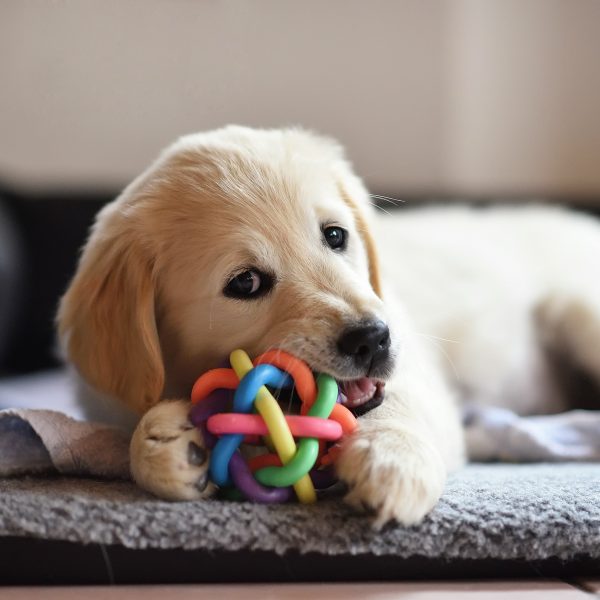Why Do Dogs Chew?

Some dogs chew more than others, and you’d be hard-pressed to find a dog that doesn’t chew. So, it’s important to start training your dog early on what they can and can’t chew on in your home. Understanding the reason why your dog is doing something can often help you redirect to something more appropriate or stop the behavior if it becomes excessive. So, why do dogs chew? Here are a few reasons:
1. It’s how dogs navigate the world.
Sure, dogs can see, but their most powerful sense is their nose. They navigate and investigate the world with their sense of smell, their hearing, and their sense of taste. Your dog can’t check out everything with their paws, so a lot of the time, they’ll use their mouth.
Not only can they carry stuff and taste it, but it also allows them to get a feel for the texture of something. Plus, if something has a smell or taste they like, a dog will often end up chewing on it. Chewing is a normal behavior that’s a fun activity for your dog, but can be an exploratory behavior too.
2. Chewing might provide relief.
Your dog could be chewing because it provides relief for them. This is especially true when it comes to puppy teething. The teething process can be painful for your puppy. Their gums might be swollen and irritated as their adult teeth come in, and chewing can often help provide some relief. Plus, they’re puppies, so they try to put everything in their mouth. At this stage, it’s important to provide some appropriate chew toys and to start establishing boundaries on what is and is not acceptable to chew on.
If an older dog is chewing a lot, they could just enjoy it or it might be a habit by that point. It could also be a sign that they have an irritation in their mouth somewhere, and chewing helps. If a dog that normally chews a lot stops chewing, you may want to check their mouth. It may be a sign that something is making it painful to chew, and it could start affecting their ability to eat as well.
3. It could be a calming behavior.
Chewing is often a calming behavior for dogs. For many dogs, it’s just fun and something that keeps them busy. For others, it could be a reaction to feeling anxious or separation anxiety. Some dogs may start chewing as a self-soothing behavior.
In the case of separation anxiety, chewing often becomes destructive because the dog is trying to self-soothe through chewing, and it’s not working, so they end up destroying things. Or, in more advanced cases of separation anxiety, the dog may end up destroying walls, doors, etc. because they are trying to get out.
4. Chewing gives them something to do.
Chewing is something to do and is often an enjoyable activity for your dog. If they are feeling bored, they may start chewing as a way to entertain themselves. Chewing and other destructive behaviors can also be signs that your dog is lonely.
If you want your dog to chew a little less, make sure they get plenty of exercise and that you are providing them with enough mental stimulation and attention. When it comes to canines, the cliches are true – a bored dog is often a destructive one and a tired dog is often a happy dog.
So, if your dog is chewing a lot and you don’t want them to be, go out and do something together – take a hike, play frisbee, go for a run, go swimming, take a trip to the dog park, etc. Find something that works for you and your dog and help them burn off some energy.
If they’re chewing because they’re home alone, invest in some puzzle toys that will keep them mentally stimulated, or ask a friend to stop by for a walk or play session. Also, be careful with squeaky toys for heavy chewers. It’s not that your dog can’t have them, but you do want to keep an eye on them to make sure they’re not eating the squeaker or materials they shouldn’t ingest once they chew through a toy.
5. They may have been trained into it.
You can’t stop a dog from chewing entirely, as it’s an instinctual and natural behavior. But, you can teach them and train them on what they are allowed to chew on. They don’t automatically know the difference between the stick they’re allowed to chew on outside and the wooden table leg you don’t want them gnawing on – you have to teach them the difference.
Poor training or even just accidentally rewarding undesirable behavior can train your dog into chewing on something you don’t want them to. If a dog is barking and chewing on something they shouldn’t be and your approach is to shush them and give them a treat for not barking, you’ve really just rewarded them for chewing on the thing they’re chewing. After a few times of this, the dog may associate chewing on that thing with treats and praise, and the next thing you know, they’ve been inadvertently trained into an undesirable behavior.
There are a lot of potential reasons why a dog is chewing. It’s a natural behavior, so there is no getting rid of it completely – there is only managing where it happens and what they chew on. But, when it comes to excessive chewing or redirecting chewing behavior to something else, knowing some other answers to the question, “why do dogs chew?” can help you get your dog chewing on their toys instead of on your shoes or the couch.
